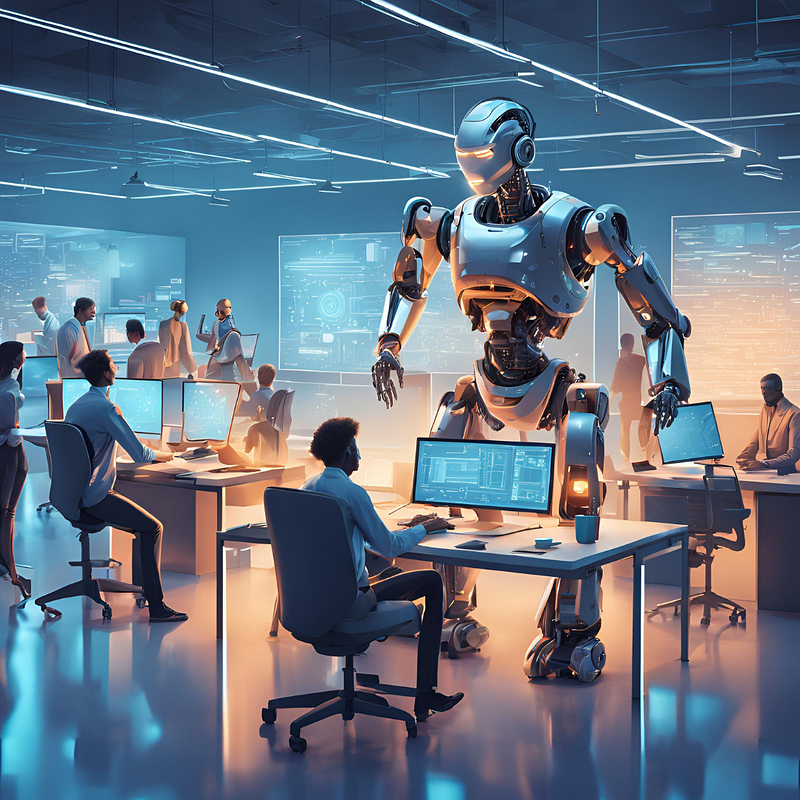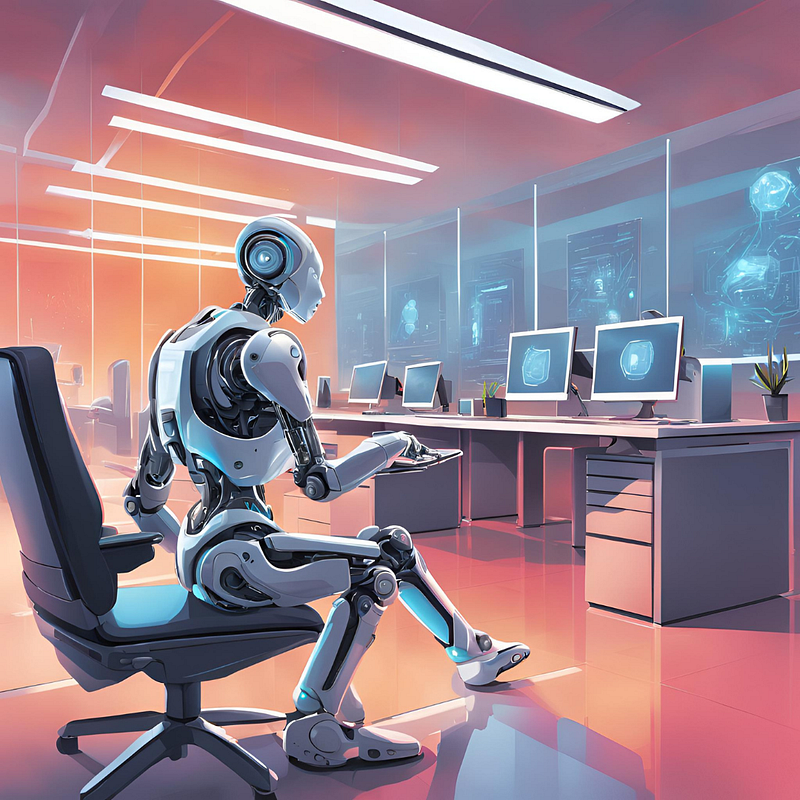- Dr. Canute Brooks Newsletter
- Posts
- AI’s Impact on Jobs: Transforming Work’s Future.
AI’s Impact on Jobs: Transforming Work’s Future.
The world of work is changing fast, thanks to artificial intelligence (AI). AI is making big changes in how we work. It’s changing jobs and creating new ones. We’ll look at how AI is changing work, the new jobs it’s creating, and why we need to adapt to these changes.

Key Takeaways
AI is rapidly transforming the workplace, disrupting traditional job roles and creating new career opportunities.
The AI-driven workforce requires a proactive approach to upskilling and reskilling to remain competitive.
Emerging AI-driven careers offer exciting prospects for professionals to leverage their skills and expertise.
Effective human-AI collaboration is crucial for navigating the challenges and harnessing the benefits of AI integration.
Embracing the AI revolution and developing AI-specific skills will be essential for shaping the future workforce.
AI Automation: Reshaping Industries and Redefining Work
The rise of AI automation, machine learning, and intelligent systems is changing industries. These advanced technologies are making their way into the workplace. They are changing traditional job roles and creating new opportunities for workers to work with AI tools.
Examining the Disruptive Potential of AI Automation
AI-powered automated systems can do many tasks fast and accurately. They are changing many industries. In fields like manufacturing and healthcare, AI is taking over repetitive tasks. This lets human workers focus on creative and strategic work.
Embracing New Opportunities in the AI-Driven Workforce
AI automation is creating new career paths and job roles. Workers need to adapt and work with intelligent systems. By using machine learning and AI, they can improve their skills and drive innovation. Embracing these AI-driven opportunities helps professionals stay ahead in the changing job market.
“The future of work is not about human versus machine, but about human and machine working in concert to unlock new possibilities.”
The Future of Work: How AI Will Transform Human Jobs and Create New Career Paths
The rise of artificial intelligence (AI) is changing the future of work. As AI technologies get better, we’ll see big changes in how we work and the jobs we’ll have. This change brings both challenges and new chances for people looking to find their place in the job market.
AI will lead to new jobs that we can’t even imagine yet. It will automate some tasks and make processes smoother. This means we’ll see jobs like AI specialists, data scientists, machine learning engineers, and ethical AI consultants. The future workforce will be filled with AI-driven careers that were once unthinkable.
AI will also change what skills are needed in different jobs. To succeed in the AI-powered world, people will need to know a lot of things. They’ll need technical skills, critical thinking, and the ability to work with AI systems. The future of work will demand a workforce that is adaptable, innovative, and adept at leveraging AI to drive productivity and innovation.
“AI will not only transform existing jobs but also create entirely new career paths that we can scarcely imagine today. The key is to embrace this evolution and position ourselves to capitalize on the emerging opportunities.”
As we look to the future, AI will be key in shaping our jobs. By understanding AI’s power and getting the right skills, people can be ready for AI-driven careers. They can help shape the future workforce.
Human-AI Collaboration: A Synergistic Approach
The world of work is changing fast, and humans and AI are teaming up more than ever. This partnership combines their best qualities for a strong and effective solution. AI is great at analyzing data, spotting patterns, and working quickly. On the other hand, humans are full of creativity, emotional smarts, and problem-solving skills.
By working together, companies can achieve new heights of innovation and productivity. AI can handle the routine tasks, letting humans focus on big-picture thinking and making important decisions. At the same time, human input helps make AI systems better, ensuring they meet company goals and values.
“The key to unlocking the full potential of AI lies in its seamless integration with human expertise and ingenuity. Together, we can push the boundaries of what’s possible.”
To make human-AI collaboration work, a fine balance is needed. Employees need to be able to work with AI, using their strengths to solve tough problems. This approach helps companies stay ahead in the fast-changing world of AI.
Artificial intelligence (AI) is changing the job world, making some jobs obsolete. But, this change also brings new chances for those who learn and grow. The way to deal with job loss due to AI is to focus on learning new AI skills.
Upskilling and Reskilling for the AI-Powered Workplace
With AI taking over some jobs, workers need to get new skills to stay ahead. Upskilling means learning more to get better at what you do. Reskilling is about getting new skills for new jobs. Both are key for success in the AI world.
Learning and adapting will be crucial for a good career in the future. Those who learn AI skills, through courses or experience, will find new roles. They’ll stay relevant in a changing job market.
“The most important skill for the future is the ability to learn new skills.”
By focusing on AI skills, workers can thrive in an AI-driven economy. They’ll stay important in the job world, adapting to new demands.
AI Job Creation: Emerging Roles and Opportunities
Artificial intelligence (AI) is changing many industries, bringing new jobs and chances. AI careers are becoming more popular. They let people join the future of work and help with the tech revolution.
Machine learning is a key area where AI jobs are growing. People skilled in making and training AI models are needed. Companies want to use AI to make things better and grow. AI job creation also means more jobs in data analysis, like data scientists and business analysts.
“The rise of AI-driven careers is not just about technical roles. We’re also seeing a surge in positions that leverage AI to augment human capabilities and enhance productivity.”
But AI jobs aren’t just for tech experts. There’s also a need for people in user experience design, digital marketing, and customer service. As AI tools get better, more jobs will focus on making things easier for people.
The future of work is changing thanks to AI. Those ready to learn new skills will do well in ai-driven careers soon.

AI-Driven Careers: Exploring Emerging Pathways
Artificial intelligence (AI) is changing many industries, opening up new career paths. These ai-driven careers are exciting for those ready to learn ai skill development. You can work in data science, machine learning, or AI design, among other areas.
Choosing an ai-driven career means you’ll be at the forefront. As more companies use AI, they need experts. By learning ai skill development, you’ll be ready for important roles that shape the future.
Leveraging AI Skills for Career Advancement
Adding ai skill development to your skills can lead to new career opportunities. Whether you’re in marketing or IT, AI can help you grow. The possibilities for ai-driven careers are endless.
By growing your ai skill development, you’ll not only keep your job but also move up. Companies want people who know how to use AI. This makes you a top candidate for exciting ai-driven careers.
“The future of work is undoubtedly AI-driven, and those who embrace this reality will be the ones to thrive in the years to come.”
When you look into ai-driven careers, remember that your ai skill development is key. Stay curious, flexible, and always learning. This way, you can open doors to new opportunities and shape your career’s future.
Future Workforce Trends: Embracing the AI Revolution
The world is moving fast towards artificial intelligence (AI). This change will deeply affect how we work. Businesses and people need to get ready for this new world. They must use AI’s benefits and solve its problems.
There’s a big need for future workforce skills that match AI. Employers want people who can work well with AI. They look for creativity, critical thinking, and emotional smarts. This means we all need to learn more about ai workforce trends to keep up.
“The future of work is not about humans versus machines, but rather about humans and machines working together to achieve greater outcomes.”
Companies that succeed will plan their workforce well. They will teach their employees new skills for an AI world. This way, they can stay ahead and grow.
The AI revolution is changing the workforce. It’s about combining human and machine skills. By understanding and preparing for these ai workforce trends, we can all do well in the future.
AI Skill Development: Empowering the Workforce
The AI revolution is changing the workplace fast. It’s crucial for people and companies to keep learning and adapting. By focusing on AI skills, workers can secure their jobs, and companies can use AI to its fullest.
Continuous Learning and Adaptation in the AI Era
Keeping up with AI changes means always learning. Workers need to get better at programming, machine learning, and using AI tools. Employers should help by creating a place where learning is encouraged.
Together, workers and companies can get ready for the future. By always learning, workers become key players in the AI world. Companies get a team that can really use AI to change things.
FAQ
How will AI and automation transform industries and redefine work?
AI and automation are changing industries fast. They automate tasks and change job roles. This brings both challenges and new chances for workers as industries adjust to the AI future.
What are the emerging career paths and job opportunities created by AI?
AI is creating many new jobs. These include AI tech roles and jobs that use AI to improve human work. People can find these AI jobs and learn the skills needed to do well in the changing job market.
How can human workers collaborate effectively with AI systems?
Working well with AI is key in today’s jobs. By using their strengths and AI’s, people can solve problems better. AI helps humans do their jobs better.
What are the challenges of AI-driven job displacement, and how can workers adapt?
AI replacing jobs is a big issue. Workers need to learn new skills to keep up. This helps them stay relevant in the changing job world.
How can individuals leverage AI skills for career advancement?
Knowing AI skills like data analysis and programming can boost careers. Showing you can use AI well opens up new job chances and career growth.
What are the key trends shaping the future workforce in the age of AI?
The future of work is shaped by trends like constant learning and adapting. It also includes planning for the workforce and creating an innovative culture. These trends help us get ready for the AI future.
How can workers and organizations ensure they are prepared for the AI-driven future of work?
Learning and developing skills are crucial for the AI era. Investing in AI skills and being adaptable helps both workers and companies succeed. This prepares them for the changing job market and AI future.